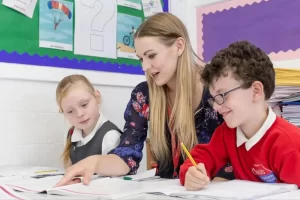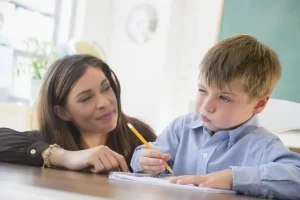
Source: istock
Inclusive education is a crucial technique in current education, providing equal learning opportunities for all children, irrespective of their abilities or situations. Though, its purpose is worth it, inclusive education faces several difficulties. Here we explore the several problems with inclusive education, which start from insufficient resources to not enough teacher training.
Such problems often delay the effectiveness of inclusive education, affecting both students and teachers. By closely inspecting these problems with inclusive education, we can better understand the difficulties and work towards better solutions. As we proceed, it’s important to recognize that addressing the problems with inclusive education is vital for its success and the improvement of our educational systems.
Inclusive education, a method that supports children with special needs, in school, has been taking hold all over the world. Here we’ll explore 10 important problems with inclusive education with some examples.
Lack of Adequate Training for Teachers
Various teachers are not skilled enough to manage the different wants of students in a general classroom. Lack of adequate teacher training will result in inadequate support for children.
A teacher may find it tough to teach a child with autism due to not having a proper idea of the condition.
Insufficient Resources
Schools normally do not have essential materials, such as specific resources or teaching materials, to support this education. For example, a school may not have Braille textbooks for visually impaired children, making it tough for them to take part in teachings.
To know more about Problems with Inclusive Education join our course, call on +919321024137 / +919869866277.
To download the brochure, Click Here!

Source: edexlive
Classroom Management Challenges
Running a classroom with children of different abilities and needs can be tough for teachers. A classic example of Classroom Management challenges could be a teacher finding it tough to balance the concentration between students with behavioral issues and those without, having an uneasy learning atmosphere.
Limited Individual Attention
In an inclusive setting, teachers may find it difficult to give personal attention. For example, a student with dyslexia may need more personal reading time, which can be tough to provide in a normal classroom which will lead to limited Individual attention.
Social Stigma and Bullying
Children with special needs may face social stigma and bullying in inclusive classrooms. An example is a child with a physical disability being left out of group games by other children, affecting their social and emotional health.
Curriculum Inflexibility
The curriculum may not always provide the needs of all children. For example, a student with a learning problem finds it tough to keep up with the speed of the course, which makes the child angry and upset.
To know more about your course, call on +919321024137 / +919869866277.
To download the brochure, Click Here!
Parental Concerns and Resistance
Some parents may be inattentive to inclusive education, fearing that it might affect the worth of education for their non-disabled children. These parental concerns and resistance can create a challenging environment for executing inclusive strategies properly.
Inadequate Assessment Methods
Traditional assessment methods may not exactly reveal the abilities and progress of students with special needs. For example, a student with a speech impairment might struggle with verbal tests, even though they understand the material.

Source: istockphoto
Lack of Collaboration among Staff
Effective inclusive education needs teamwork among teachers, special educators, and support staff, which is often missing. A situation where a regular teacher and a special educator do not cooperate properly can lead to a lack of support for students with special needs.
Cultural and Linguistic Barriers
In a culturally varied classroom, language and cultural differences can lead to additional difficulties. A non-native English speaker with a learning disability, for example, might face difficulties in understanding lessons and expressing themselves. Cultural and Linguistic barriers can occur occasionally but cannot be ignored.
These problems with inclusive education show the need for more complete strategies, materials, and training to make sure that all students get the education they deserve. Understanding these challenges is vital for the success of inclusive education models.
To know more about special education courses, call +919321024137 / +919869866277.
To download the brochure, Click Here!
Inclusive Education Course
In the growing world of education, inclusive education course stands as an example of hope and progress. It’s a concept that commits equal learning opportunities for all students, irrespective of their abilities or disabilities. However, the journey towards truly inclusive education is not without its difficulties. Knowing this, the Vidhyanidhi Education Society (Govt. regd.) has made courses that not only give knowledge about problems with Inclusive Education but also provide proper solutions.

Source: forbes
Understanding the Problems with Inclusive Education
Before going into the solutions provided by VES it’s necessary to understand the problems that often delay the development of inclusive education:
Lack of Specialized Training
Teachers frequently face difficulties due to inadequate training in managing various needs in a classroom.
Resource Allocation
Schools sometimes face problems with giving appropriate materials to support inclusive education.
Social Integration
Making sure that all students, especially those with special needs, are fully provided into the school community can be challenging.
Adaptation of Curriculum
Adjusting the curriculum to provide a vast range of learning skills is a crucial task.
Awareness and Sensitivity
There is a non-stop need for raising awareness and compassion among students and staff towards varied learning needs.
Let’s explore their offerings
Special Education Needs Course
- Target Audience: Teachers, parents, and people who are interested in considering special education.
- Focus: This course focuses on the strategies for providing to students with special educational needs. It involves modules on knowing these wants and implying proper teaching techniques.
Learning Disability Course
- Target Audience: Teachers, special teachers, and family.
- Focus: This course looks into the empathy and support of learning disabilities. It offers tools for creating an enabling environment for students with learning disabilities.
Shadow Teachers’ Training Course
- Target Audience: Aspiring shadow teachers and educators.
- Focus: This training is dedicated to preparing individuals to work closely with children requiring additional support in a classroom setting. It covers techniques for one-on-one assistance and behavioral management.
In-Depth Coverage of Inclusive Education
Each of these courses at VES offers in-depth knowledge and practical skills in inclusive education. Participants gain:
- Vision into Inclusive Practices: Understanding the values of inclusive education and how to apply them to practical experiences
- Techniques for Classroom Management: Learning how to handle a varied classroom properly.
- Behavioral Intervention Techniques: Gaining abilities to overcome various behavioral challenges and difficulties.
- Assessment and Evaluation Methods: Learning to measure and evaluate the progress of students with special needs truly.
The journey of proper inclusive education is filled with difficulties, but with the right approach and training, these problems can be solved. Vidhyanidhi Education Society- through its special courses, provides teachers and parents with the tools essential to change these challenges into opportunities for growth and learning. By directing on these critical areas,
Transform Problems with Inclusive Education into Success with VES courses – Join now & lead change!
To know more about your course, call on +919321024137 / +919869866277.
To download the brochure, Click Here!
FAQs
In Which Institution We Can Learn About Inclusive Education?
VES offers various Special Education Needs courses, teaching implementation of inclusive education effectively.
What Is The Goal Of Inclusive Education?
The goal of inclusive education is to give learning chances for all children, irrespective of their abilities and experiences.
What Is The Example For Inclusive Education?
The best example of inclusive education is a schoolroom where students of all abilities learn together with proper support and resources.



